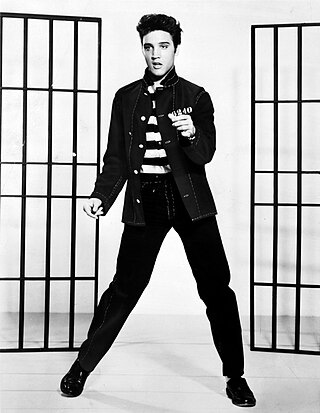
Elvis Aaron Presley, known mononymously as Elvis, was an American singer and actor. Known as the "King of Rock and Roll", he is regarded as one of the most significant cultural figures of the 20th century. Presley's energized interpretations of songs and sexually provocative performance style, combined with a singularly potent mix of influences across color lines during a transformative era in race relations, brought both great success and initial controversy.
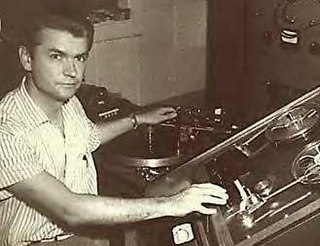
Samuel Cornelius Phillips was an American disc jockey, songwriter and record producer. He was the founder of Sun Records and Sun Studio in Memphis, Tennessee, where he produced recordings by Elvis Presley, Roy Orbison, Jerry Lee Lewis, Carl Perkins, Johnny Cash, and Howlin' Wolf. Phillips played a major role in the development of rock and roll during the 1950s, launching the career of Presley. In 1969, he sold Sun to Shelby Singleton.

Carl Lee Perkins was an American guitarist, singer and songwriter. A rockabilly great and pioneer of rock and roll, he began his recording career at the Sun Studio, in Memphis, beginning in 1954. Among his best-known songs are "Blue Suede Shoes", "Honey Don't", "Matchbox" and "Everybody's Trying to Be My Baby".

"Heartbreak Hotel" is a song recorded by American singer Elvis Presley. It was released as a single on January 27, 1956, Presley's first on his new record label RCA Victor. It was written by Mae Boren Axton and Tommy Durden, with credit being given also to Presley. A newspaper article about the suicide of a lonely man who jumped from a hotel window inspired the song. Axton presented the song to Presley in November 1955 at a country music convention in Nashville. Presley recorded it on January 10, 1956, in a session with his band, the Blue Moon Boys, the guitarist Chet Atkins and the pianist Floyd Cramer. "Heartbreak Hotel" comprises an eight-bar blues progression, with heavy reverberation throughout the track, to imitate the character of Presley's Sun recordings.

Richard Wayne Penniman, known professionally as Little Richard, was an American singer, pianist, and songwriter. He was an influential figure in popular music and culture for seven decades. Described as the "Architect of Rock and Roll", Richard's most celebrated work dates from the mid-1950s, when his charismatic showmanship and dynamic music, characterized by frenetic piano playing, pounding back beat and powerful raspy vocals, laid the foundation for rock and roll. Richard's innovative emotive vocalizations and uptempo rhythmic music played a key role in the formation of other popular music genres, including soul and funk. He influenced singers and musicians across musical genres from rock to hip hop; his music helped shape rhythm and blues for generations.

Antoine Dominique Domino Jr., known as Fats Domino, was an American singer-songwriter and pianist. One of the pioneers of rock and roll music, Domino sold more than 65 million records. Born in New Orleans to a French Creole family, Domino signed to Imperial Records in 1949. His first single "The Fat Man" is cited by some historians as the first rock and roll single and the first to sell more than 1 million copies. Domino continued to work with the song's co-writer Dave Bartholomew, contributing his distinctive rolling piano style to Lloyd Price's "Lawdy Miss Clawdy" (1952) and scoring a string of mainstream hits beginning with "Ain't That a Shame" (1955). Between 1955 and 1960, he had eleven Top 10 US pop hits. By 1955, five of his records had sold more than a million copies, being certified gold.
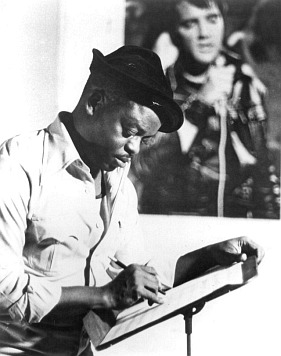
Otis Blackwell was an American songwriter whose work influenced rock and roll. His compositions include "Fever", "Great Balls of Fire" and "Breathless", "Don't Be Cruel", "All Shook Up", and "Return to Sender", and "Handy Man".

"Hound Dog" is a twelve-bar blues song written by Jerry Leiber and Mike Stoller. Recorded originally by Big Mama Thornton on August 13, 1952, in Los Angeles and released by Peacock Records in late February 1953, "Hound Dog" was Thornton's only hit record, selling over 500,000 copies, spending 14 weeks in the R&B charts, including seven weeks at number one. Thornton's recording of "Hound Dog" is listed as one of the Rock and Roll Hall of Fame's "500 Songs That Shaped Rock and Roll", ranked at 318 in the 2021 iteration of Rolling Stone's 500 Greatest Songs of All Time and was inducted into the Grammy Hall of Fame in February 2013.

"Good Golly, Miss Molly" is a rock 'n' roll song first recorded in 1956 by American musician Little Richard and released in January 1958 as Specialty single 624, and later on Little Richard in July 1958. The song, a jump blues, was written by John Marascalco and producer Robert "Bumps" Blackwell. Although it was first recorded by Little Richard, Blackwell produced another version by the Valiants, who imitated the fast first version recorded by Little Richard, not released at that time. Although the Valiants' version was released first, Little Richard had the hit, reaching No. 4. Like all his early hits, it quickly became a rock 'n' roll standard and has subsequently been recorded by hundreds of artists. The song is ranked No. 92 on the Rolling Stone magazine's list of the 500 Greatest Songs of All Time.
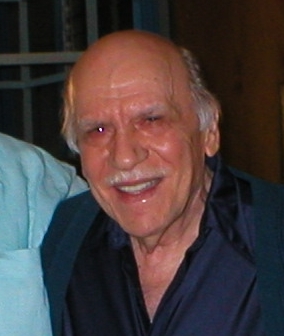
John S. Marascalco was an American songwriter most noted for the songs he wrote for Little Richard. He was born in Grenada, Mississippi and died in Los Angeles, California.

The Girl Can't Help It is a 1956 American musical comedy film starring Jayne Mansfield in the lead role, Tom Ewell, Edmond O'Brien, Henry Jones, and Julie London. The picture was produced and directed by Frank Tashlin, with a screenplay adapted by Tashlin and Herbert Baker from an uncredited 1955 short story, "Do Re Mi" by Garson Kanin. Filmed in DeLuxe Color, the production was originally intended as a vehicle for the American sex symbol Jayne Mansfield, with a satirical subplot involving teenagers and rock 'n' roll music. The unintended result has been called the "most potent" celebration of rock music ever captured on film.
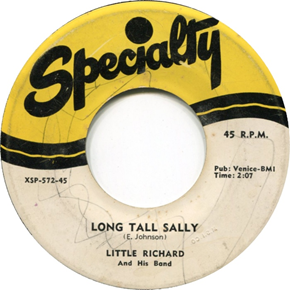
"Long Tall Sally", also known as "Long Tall Sally (The Thing)", is a rock and roll song written by Robert "Bumps" Blackwell, Enotris Johnson, and Little Richard. Richard recorded it for Specialty Records, which released it as a single in March 1956, backed with "Slippin' and Slidin'".

"Tutti Frutti" is a song written by Little Richard and Dorothy LaBostrie, recorded in 1955, which was his first major hit. With its energetic refrain, often transcribed as "A-wop-bop-a-loo-mop-a-lop-bam-boom!", and its hard-driving sound and wild lyrics, it became not only a model for many future Little Richard songs, but also for rock and roll itself. The song introduced several of rock music's most characteristic musical features, including its loud volume, powerful vocal style, and distinctive beat and rhythm.
Arthur Newton Rupe was an American music executive and record producer. He founded Specialty Records, known for its rhythm and blues, blues, gospel and early rock and roll music recordings, in Los Angeles in 1946.

"Lucille" is a 1957 rock and roll song originally recorded by American musician Little Richard. Released on Specialty Records in February 1957, the single reached number 1 on the Billboard R&B chart, 21 on the US pop chart, and number 10 on the UK chart. It was composed by Albert Collins and Little Richard. First pressings of Specialty 78rpm credit Collins as the sole writer. Little Richard bought half of the song's rights while Collins was in Louisiana State Penitentiary.

Robert Lee "Chan" Romero was an American rock and roll performer, best known for his 1959 song "Hippy Hippy Shake".

Since the beginning of his career, American singer Elvis Presley has had an extensive cultural impact. According to the monthly magazine, Rolling Stone, "It was Elvis who made rock 'n' roll the international language of pop." The Rolling Stone Encyclopedia of Rock & Roll describes Presley as "an American music giant of the 20th century who single-handedly changed the course of music and culture in the mid-1950s". His recordings, dance moves, attitude, and clothing came to be seen as embodiments of rock and roll. His music was heavily influenced by African-American blues, Christian gospel, and Southern country. In a list of the greatest English language singers, as compiled by Q magazine, Presley was ranked first, and second in the list of greatest singers of the 20th century by BBC Radio. Some people claim that Presley created a whole new style of music: "It wasn't black, wasn't white, wasn't pop or wasn't country—it was different." As most singers in his time created music geared for adults, he gave teens music to grow up with.
Welcome Home Elvis is a 1960 television special on the ABC Television Network starring Frank Sinatra and featuring Elvis Presley in his first televised appearance following his military service in West Germany. The special, commonly known as Welcome Home Elvis, was officially titled It's Nice to Go Traveling, a reference to the Sinatra song "It's Nice to Go Trav'ling". This was Presley's first TV appearance in three years. This was also Frank Sinatra's fourth and final Timex sponsored outing for the 1959–60 television season.
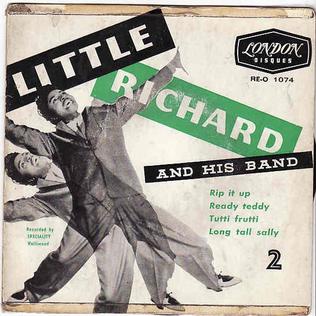
"Rip It Up" is a rock and roll song written by Robert Blackwell and John Marascalco. In June 1956, Specialty Records released it as a single by Little Richard with "Ready Teddy" as the B-side. The song reached the top position on the Billboard Rhythm & Blues Records chart as well as number 17 on the magazine's broader Billboard Hot 100. The version peaked at number 30 in the UK Singles Chart. The song was also recorded by Elvis Presley in 1956.
This article includes an overview of the major events and trends in popular music in the 1950s.
















